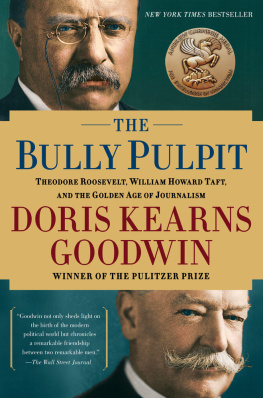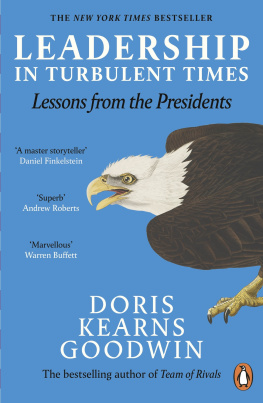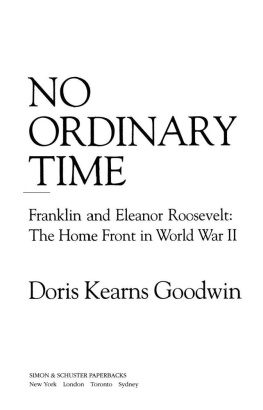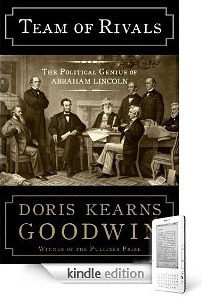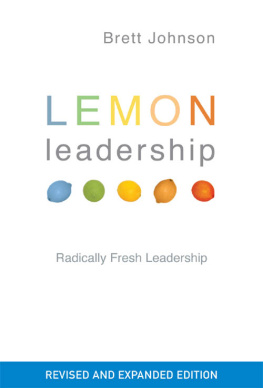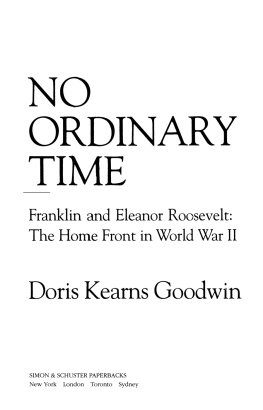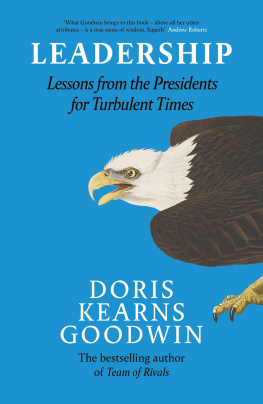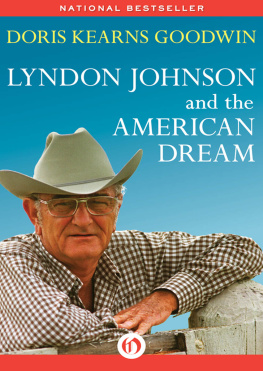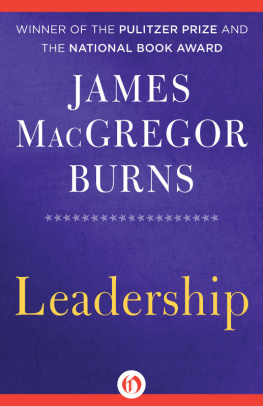Thank you for downloading this Simon & Schuster ebook.
Get a FREE ebook when you join our mailing list. Plus, get updates on new releases, deals, recommended reads, and more from Simon & Schuster. Click below to sign up and see terms and conditions.
CLICK HERE TO SIGN UP
Already a subscriber? Provide your email again so we can register this ebook and send you more of what you like to read. You will continue to receive exclusive offers in your inbox.
We hope you enjoyed reading this Simon & Schuster ebook.
Get a FREE ebook when you join our mailing list. Plus, get updates on new releases, deals, recommended reads, and more from Simon & Schuster. Click below to sign up and see terms and conditions.
CLICK HERE TO SIGN UP
Already a subscriber? Provide your email again so we can register this ebook and send you more of what you like to read. You will continue to receive exclusive offers in your inbox.
A LSO BY
D ORIS K EARNS G OODWIN
The Bully Pulpit: Theodore Roosevelt, William Howard Taft, and the Golden Age of Journalism
Team of Rivals: The Political Genius of Abraham Lincoln
Wait Till Next Year: A Memoir
No Ordinary Time: Franklin and Eleanor Roosevelt: The Home Front in World War II
The Fitzgeralds and the Kennedys
Lyndon Johnson and the American Dream

Simon & Schuster
1230 Avenue of the Americas
New York, NY 10020
www.SimonandSchuster.com
Copyright 2018 by Blithedale Productions, Inc.
All rights reserved, including the right to reproduce this book or portions thereof in any form whatsoever. For information, address Simon & Schuster Subsidiary Rights Department, 1230 Avenue of the Americas, New York, NY 10020.
First Simon & Schuster hardcover edition September 2018
SIMON & SCHUSTER and colophon are registered trademarks of Simon & Schuster, Inc.
For information about special discounts for bulk purchases, please contact Simon & Schuster Special Sales at 1-866-506-1949 or .
The Simon & Schuster Speakers Bureau can bring authors to your live event. For more information or to book an event, contact the Simon & Schuster Speakers Bureau at 1-866-248-3049 or visit our website at www.simonspeakers.com.
Interior design by Lewelin Polanco
Cover design by John Caruso
Library of Congress Cataloging-in-Publication Data is available.
ISBN 978-1-4767-9592-8
ISBN 978-1-4767-9594-2 (ebook)
For my husband, Richard Goodwin, and our best man and closest friend, Michael Rothschild
F OREWORD
A braham Lincoln, Theodore Roosevelt, Franklin Roosevelt, and Lyndon Johnsonthe lives and times of these four men have occupied me for half a century. I have awakened with them in the morning and thought about them when I went to bed at night. By immersing myself in manuscript collections, personal diaries, letters, oral histories, memoirs, newspaper archives, and periodicals, I searched for illuminating details that, taken together, would provide an intimate understanding of these men, their families, their friends, their colleagues, and the worlds in which they lived.
After writing four extensive books devoted to these men, I thought I knew them well before I embarked on this present study of leadership nearly five years ago. But as I observed them through the exclusive lens of leadership, I felt as if I were meeting them anew. There was much to learn as the elusive theme of leadership assumed center stage. As I turned to works of philosophy, literature, business, political science, and comparative studies, in addition to history and biography, I found myself engaged in an unexpectedly personal and emotional kind of storytelling. I returned to fundamental questions I had not asked so openly since my days of college and graduate school.
Are leaders born or made? Where does ambition come from? How does adversity affect the growth of leadership? Do the times make the leader or does the leader shape the times? How can a leader infuse a sense of purpose and meaning into peoples lives? What is the difference between power, title, and leadership? Is leadership possible without a purpose larger than personal ambition?
How fondly I remember long and heated sessions over just such questions with my graduate school friends, arguing through the night with a fervor surpassing our level of knowledge. Yet, at bottom, something in these discussions was exactly on the mark, for they engaged us deeply, tapped our idealism, and challenged us to figure out how we wanted to live our own lives. I realize now that debates such as these put me on the path to find my own calling as a historian.
In Part One we see the four men when they first entered public life. In their twenties, when they set forth to forge their public identities, they appear very different from the sober, iconic countenances that have since saturated our culture, currency, and memorial sculpture. Their paths were anything but certain. Their stories abound in confusion, hope, failure, and fear. We follow mistakes made along the way, from inexperience, cockiness, lack of caution, outright misjudgments, and selfishness, and see the efforts made to acknowledge, conceal, or overcome these mistakes. Their struggles are not so different from our own.
No single path carried them to the pinnacle of political leadership. Theodore Roosevelt and Franklin Roosevelt were born to extraordinary privilege and wealth. Abraham Lincoln endured relentless poverty. Lyndon Johnson experienced sporadic hard times. They differed widely in temperament, appearance, and physical ability. They were endowed with a divergent range of qualities often ascribed to leadershipintelligence, energy, empathy, verbal and written gifts, and skills in dealing with people. They were united, however, by a fierce ambition, an inordinate drive to succeed. With perseverance and hard work, they all essentially made themselves leaders by enhancing and developing the qualities they were given.
All four men were recognized as leaders long before they reached the presidency. And like rocks in a polishing cylinder, all four were brought to shine by tumbling contact with a wide variety of people. They had found their vocation in politics. I have often thought, American philosopher William James wrote of the mysterious formation of identity, that the best way to define a mans character would be to seek out the particular mental or moral attitude in which, when it came upon him, he felt himself most deeply and intensely alive and active. At such moments, there is a voice inside which speaks and says, This is the real me!
Dramatic reversals that shattered the private and public lives of all four men are the subject of Part Two. They were at different life stages when forced to deal with events that ruptured their sense of self and threatened to curtail their prospects. The nature of the adversity that assailed each was unique: Abraham Lincoln suffered a blow to his public reputation and his private sense of honor that led to a near-suicidal depression; Theodore Roosevelt lost his young wife and his mother on the same day; Franklin Roosevelt was struck by polio and left permanently paralyzed from the waist down; Lyndon Johnson lost an election to the United States Senate. To draw an analogy between an election loss and the tragic reversals experienced by the others would appear, on the surface, ludicrous; but Lyndon Johnson construed rejection by the people as a judgment upon, and a repudiation of, his deepest self. For a long while, the election loss negatively changed the direction of his career until a massive heart attack and the proximity of death repurposed his life.
Next page
